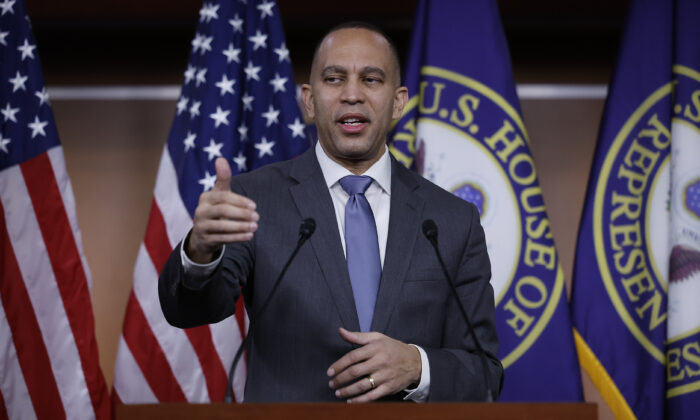Bipartisanship is a rare occurrence among members of the House Judiciary Committee, but on Nov. 6, it was widespread.
The committee voted 35–2 to advance a bill that would amend Section 702 of the Foreign Intelligence Surveillance Act (FISA) to prohibit warrantless queries for the communications of U.S. citizens and those located within the country—save for in emergency situations.
Dubbed the “Protect Liberty and End Warrantless Surveillance Act,” the bill would also limit the number of FBI personnel who can search the controversial surveillance database that Section 702 authorizes, among other reforms.
Under Section 702, U.S. officials are authorized to surveil the communications of noncitizens located outside of the United States without a warrant. But reports of FBI employees abusing the associated database to conduct unauthorized queries of U.S. persons have been numerous in recent years, sparking outrage and calls for reform….
House Judiciary Committee Advances FISA Reform Bill in Show of Bipartisanship
A bipartisan effort to reform the controversial Foreign Intelligence Surveillance Act (FISA) took a major step forward on Wednesday, December 6, 2023, when the House Judiciary Committee passed a bill by a vote of 35-2. The bill, known as the USA Liberty Act, would make significant changes to Section 702 of FISA, which allows the government to collect the communications of Americans who are not suspected of wrongdoing if they are in contact with foreign targets.
The passage of the bill was a rare moment of bipartisanship in the heavily divided House of Representatives. The legislation was sponsored by a group of Democrats and Republicans, including Chairman Jerrold Nadler (D-NY) and Ranking Member Jim Jordan (R-OH).
The bill would make several key reforms to FISA:
- It would require the government to obtain a warrant from a judge before it can collect the communications of Americans under Section 702.
- It would close the “backdoor search loophole,” which allows the government to search for the communications of Americans without a warrant if they are incidentally collected in the course of surveillance on foreign targets.
- It would increase transparency about the government’s use of FISA, including requiring the government to report on the number of Americans whose communications are collected under the program.
The bill is supported by a broad range of civil liberties groups, including the ACLU, the Electronic Frontier Foundation, and Human Rights Watch. They argue that the current FISA regime is too broad and allows for the government to collect the communications of Americans without adequate safeguards.
The bill is also supported by some national security experts, who argue that the reforms would make FISA more effective by requiring the government to focus on collecting the communications of actual foreign threats.
However, the bill is opposed by some law enforcement officials, who argue that it would make it more difficult for them to track down terrorists and other criminals.
The passage of the bill by the House Judiciary Committee is a significant victory for those who have been calling for reforms to FISA. The bill now goes to the full House for a vote, and it is expected to pass. If it does, it will then go to the Senate, where its fate is more uncertain.
The USA Liberty Act is a major step forward in the effort to protect the privacy of Americans while also ensuring that the government has the tools it needs to keep us safe.
Here are some of the key provisions of the USA Liberty Act:
- Warrant requirement: The bill would require the government to obtain a warrant from a judge before it can collect the communications of Americans under Section 702. This would provide a crucial safeguard against the government collecting the communications of innocent Americans.
- Closing the “backdoor search loophole”: The bill would close the “backdoor search loophole,” which allows the government to search for the communications of Americans without a warrant if they are incidentally collected in the course of surveillance on foreign targets. This would close a major loophole in the current FISA regime.
- Increased transparency: The bill would increase transparency about the government’s use of FISA, including requiring the government to report on the number of Americans whose communications are collected under the program. This would allow the public to hold the government accountable for its use of FISA.
The USA Liberty Act is a long-overdue reform to FISA. It would protect the privacy of Americans while also ensuring that the government has the tools it needs to keep us safe.
The passage of the bill by the House Judiciary Committee is a major victory for those who have been calling for reforms to FISA. The bill now goes to the full House for a vote, and it is expected to pass. If it does, it will then go to the Senate, where its fate is more uncertain.
It is important to note that the USA Liberty Act is not a perfect bill. It does not go as far as some reformers would like, and it still allows the government to collect the communications of Americans without a warrant in some cases. However, it is a significant step forward in the effort to protect the privacy of Americans while also ensuring that the government has the tools it needs to keep us safe.
The passage of the USA Liberty Act sends a clear message that the American people are no longer willing to tolerate the government’s mass collection of their communications. It is a victory for the rule of law and for the privacy of all Americans.




